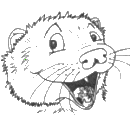A cautionary warning regarding dietary supplements
by Dr June McNicholas
One of the best things about attending ferret shows is the chance to swap views and news about ferret care. A general chat at the 1996 Christmas show resulted in the suggestion that I write an article about some of the less obvious dietary problems that may be seen in our ferrets.
Until recently most advice concerning ferret nutrition has been focused on avoiding an inadequate diet, and quite rightly too, considering the "feed 'em bread and milk" mentality that has often persisted. However, with the advent of a complete food and the variety of vitamin and mineral supplements (Ferretone, Linatone, Ferretvite etc.) now available on the market, there perhaps needs to be a timely reminder that dietary can also result from the over-provision of various vitamins and minerals.
Complete foods are just that - they contain all the nutritional requirements most ferrets need. Fresh diets, on the other hand, may need some supplementing in the form of vitamins and minerals to attain the equivalent nutrition. The question of what you give, in what amounts and in what combination, is important since it can lead to health problems. Dietary supplements can certainly have their place for pregnant and lactating jills or for sick or convalescing ferrets but an excess, or a prolonged combination of complete meal and supplement, can interfere with nutritional balance. Unfortunately, many owners - and this isn't confined to ferrets - are tempted to give both or to give excessive amounts 'just to be sure' their ferrets get enough or to try to promote growth in kits. The effects can be as bad as giving a deficit diet. Whilst a number of vitamins, such as the Vitamin B group, are water soluble and any surplus is merely excreted (giving you an expensive dung heap in the corner of the cage), some are stored in the body and are toxic in excess. Vitamin A, high in both complete foods, and vitamin supplements, is not excreted but stored in the liver. In mammals this is known to give rise to forms of cirrhosis, bone pain, bone malformation and anorexia. In America, vets have suggested a link between too-liberal usage of supplements and liver damage, lameness and poor appetite in adult ferrets, and bone problems in youngsters. This has prompted a recommendation that vitamin supplements not prescribed by vets should be diluted with olive oil if intended to be used fairly regularly as treats.
Vitamin D, necessary to maintain calcium and phosphorous levels for bone growth, may also be unwittingly over provided through proprietary supplements or cod liver oil. Symptoms of excess may be anorexia and calcification of soft tissues resulting in damage to joints, pain and lameness.
Mineral supplements, proprietary or otherwise, should also be used with caution if an otherwise adequate diet is fed. The principal dangers are excess intake of calcium and phosphorous. Bones and bonemeal are essential to bone growth and form the basis of most mineral supplements. However, too much in a diet can result in very high levels of bone deformity. Rickets, normally associated with a calcium deficiency, can also be due to an excess of phosphorous in the diet, whilst calcium excess can produce severe abnormalities in bone growth in young animals and deformities in older animals.
Other minerals known to be harmful in excess are iron (producing weight loss and lethargy), copper (anaemia and occasionally hepatitis), and iodine. Strangely, the symptoms of excess iodine are similar to those of iodine deficiency, being hair loss and lethargy.
Although these dietary problems are well-known in other mammals, so far little is known of their effect in ferrets, probably due to the fact that up to now ferret diets have tended toward the inadequate rather than the over adequate. However, the dangers are real and are all the more sad because they are most likely to affect owners who genuinely care for their ferrets and want to do the best for them. Equally disturbing is whether such problems would be readily recognised by vets.
Considering the difficulties many of us have in finding a vet who is knowledgeable or sympathetic to ferrets, it is a real possibility that any dietary imbalances would be undetected. It is also likely that a ferret thought to be sick may well be given extra supplements!
It would be wrong to dissuade anyone from using complete foods and/or supplements. Indeed, they are to be welcomed for the sake of most ferrets. But caution is needed to guard against over zealous or unnecessary use of supplements in an already balanced diet unless there is clear medical need. I have seen so many distressing cases in other animals that have resulted in permanent health damage, I would never wish to see these problems arise in ferrets. Perhaps the bottom line is that the price we have to pay for the nutritional value and convenience of these ferret products is our vigilance in how and when we use them.
